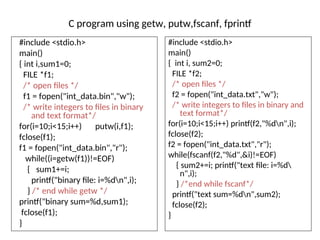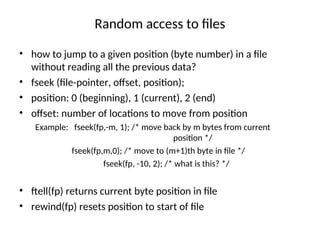C-Programming Chapter 5 File-handling-C.ppt
- 1. Chapter 5 File Handling in C 1 Dr. A. PHILIP AROKIADOSS Assistant Professor Department of Statistics St. Joseph’s College (Autonomous) Tiruchirappalli-620 002.
- 2. Console oriented Input/Output • Console oriented – use terminal (keyboard/screen) • scanf(“%d”,&i) – read data from keyboard • printf(“%d”,i) – print data to monitor • Suitable for small volumes of data • Data lost when program terminated
- 3. Real-life applications • Large data volumes • E.g. physical experiments (CERN collider), human genome, population records etc. • Need for flexible approach to store/retrieve data • Concept of files
- 4. Files • File – place on disc where group of related data is stored – E.g. your C programs, executables • High-level programming languages support file operations – Naming – Opening – Reading – Writing – Closing
- 5. Defining and opening file • To store data file in secondary memory (disc) must specify to OS – Filename (e.g. sort.c, input.data) – Data structure (e.g. FILE) – Purpose (e.g. reading, writing, appending)
- 6. Filename • String of characters that make up a valid filename for OS • May contain two parts – Primary – Optional period with extension • Examples: a.out, prog.c, temp, text.out
- 7. General format for opening file • fp – contains all information about file – Communication link between system and program • Mode can be – r open file for reading only – w open file for writing only – a open file for appending (adding) data FILE *fp; /*variable fp is pointer to type FILE*/ fp = fopen(“filename”, “mode”); /*opens file with name filename , assigns identifier to fp */
- 8. Different modes • Writing mode – if file already exists then contents are deleted, – else new file with specified name created • Appending mode – if file already exists then file opened with contents safe – else new file created • Reading mode – if file already exists then opened with contents safe – else error occurs. FILE *p1, *p2; p1 = fopen(“data”,”r”); p2= fopen(“results”, w”);
- 9. Additional modes • r+ open to beginning for both reading/writing • w+ same as w except both for reading and writing • a+ same as ‘a’ except both for reading and writing
- 10. Closing a file • File must be closed as soon as all operations on it completed • Ensures – All outstanding information associated with file flushed out from buffers – All links to file broken – Accidental misuse of file prevented • If want to change mode of file, then first close and open again
- 11. Closing a file • pointer can be reused after closing Syntax: fclose(file_pointer); Example: FILE *p1, *p2; p1 = fopen(“INPUT.txt”, “r”); p2 =fopen(“OUTPUT.txt”, “w”); …….. …….. fclose(p1); fclose(p2);
- 12. Input/Output operations on files • C provides several different functions for reading/writing • getc() – read a character • putc() – write a character • fprintf() – write set of data values • fscanf() – read set of data values • getw() – read integer • putw() – write integer
- 13. getc() and putc() • handle one character at a time like getchar() and putchar() • syntax: putc(c,fp1); – c : a character variable – fp1 : pointer to file opened with mode w • syntax: c = getc(fp2); – c : a character variable – fp2 : pointer to file opened with mode r • file pointer moves by one character position after every getc() and putc() • getc() returns end-of-file marker EOF when file end reached
- 14. Program to read/write using getc/putc #include <stdio.h> main() { FILE *fp1; char c; f1= fopen(“INPUT”, “w”); /* open file for writing */ while((c=getchar()) != EOF) /*get char from keyboard until CTL-Z*/ putc(c,f1); /*write a character to INPUT */ fclose(f1); /* close INPUT */ f1=fopen(“INPUT”, “r”); /* reopen file */ while((c=getc(f1))!=EOF) /*read character from file INPUT*/ printf(“%c”, c); /* print character to screen */ fclose(f1); } /*end main */
- 15. fscanf() and fprintf() • similar to scanf() and printf() • in addition provide file-pointer • given the following – file-pointer f1 (points to file opened in write mode) – file-pointer f2 (points to file opened in read mode) – integer variable i – float variable f • Example: fprintf(f1, “%d %fn”, i, f); fprintf(stdout, “%f n”, f); /*note: stdout refers to screen */ fscanf(f2, “%d %f”, &i, &f); • fscanf returns EOF when end-of-file reached
- 16. getw() and putw() • handle one integer at a time • syntax: putw(i,fp1); – i : an integer variable – fp1 : pointer to file ipened with mode w • syntax: i = getw(fp2); – i : an integer variable – fp2 : pointer to file opened with mode r • file pointer moves by one integer position, data stored in binary format native to local system • getw() returns end-of-file marker EOF when file end reached
- 17. C program using getw, putw,fscanf, fprintf #include <stdio.h> main() { int i,sum1=0; FILE *f1; /* open files */ f1 = fopen("int_data.bin","w"); /* write integers to files in binary and text format*/ for(i=10;i<15;i++) putw(i,f1); fclose(f1); f1 = fopen("int_data.bin","r"); while((i=getw(f1))!=EOF) { sum1+=i; printf("binary file: i=%dn",i); } /* end while getw */ printf("binary sum=%d,sum1); fclose(f1); } #include <stdio.h> main() { int i, sum2=0; FILE *f2; /* open files */ f2 = fopen("int_data.txt","w"); /* write integers to files in binary and text format*/ for(i=10;i<15;i++) printf(f2,"%dn",i); fclose(f2); f2 = fopen("int_data.txt","r"); while(fscanf(f2,"%d",&i)!=EOF) { sum2+=i; printf("text file: i=%d n",i); } /*end while fscanf*/ printf("text sum=%dn",sum2); fclose(f2); }
- 18. On execution of previous Programs $ ./a.out binary file: i=10 binary file: i=11 binary file: i=12 binary file: i=13 binary file: i=14 binary sum=60, $ cat int_data.txt 10 11 12 13 14 $ ./a.out text file: i=10 text file: i=11 text file: i=12 text file: i=13 text file: i=14 text sum=60 $ more int_data.bin ^@^@^@^K^@^@^@^L^@^@^@^ M^@^@^@^N^@^@^@ $
- 19. Errors that occur during I/O • Typical errors that occur – trying to read beyond end-of-file – trying to use a file that has not been opened – perform operation on file not permitted by ‘fopen’ mode – open file with invalid filename – write to write-protected file
- 20. Error handling • given file-pointer, check if EOF reached, errors while handling file, problems opening file etc. • check if EOF reached: feof() • feof() takes file-pointer as input, returns nonzero if all data read and zero otherwise if(feof(fp)) printf(“End of datan”); • ferror() takes file-pointer as input, returns nonzero integer if error detected else returns zero if(ferror(fp) !=0) printf(“An error has occurredn”);
- 21. Error while opening file • if file cannot be opened then fopen returns a NULL pointer • Good practice to check if pointer is NULL before proceeding fp = fopen(“input.dat”, “r”); if (fp == NULL) printf(“File could not be opened n ”);
- 22. Random access to files • how to jump to a given position (byte number) in a file without reading all the previous data? • fseek (file-pointer, offset, position); • position: 0 (beginning), 1 (current), 2 (end) • offset: number of locations to move from position Example: fseek(fp,-m, 1); /* move back by m bytes from current position */ fseek(fp,m,0); /* move to (m+1)th byte in file */ fseek(fp, -10, 2); /* what is this? */ • ftell(fp) returns current byte position in file • rewind(fp) resets position to start of file
- 23. Command line arguments • can give input to C program from command line E.g. > prog.c 10 name1 name2 …. • how to use these arguments? main ( int argc, char *argv[] ) • argc – gives a count of number of arguments (including program name) • char *argv[] defines an array of pointers to character (or array of strings) • argv[0] – program name • argv[1] to argv[argc -1] give the other arguments as strings
- 24. Example args.c $ cc args.c -o args.out $ ./args.out 2 join leave 6 6 leave join 2 ./args.out $ #include <stdio.h> main(int argc,char *argv[]) { while(argc>0) /* print out all arguments in reverse order*/ { printf("%sn",argv[argc-1]); argc--; } }






















![Command line arguments
• can give input to C program from command line
E.g. > prog.c 10 name1 name2 ….
• how to use these arguments?
main ( int argc, char *argv[] )
• argc – gives a count of number of arguments (including
program name)
• char *argv[] defines an array of pointers to character (or array
of strings)
• argv[0] – program name
• argv[1] to argv[argc -1] give the other arguments as strings](https://image.slidesharecdn.com/c-programmingchapter5file-handling-c-250122040759-6fffdb48/85/C-Programming-Chapter-5-File-handling-C-ppt-23-320.jpg)
![Example args.c
$ cc args.c -o args.out
$ ./args.out 2 join leave 6
6
leave
join
2
./args.out
$
#include <stdio.h>
main(int argc,char *argv[])
{
while(argc>0) /* print out all arguments in reverse order*/
{
printf("%sn",argv[argc-1]);
argc--;
}
}](https://image.slidesharecdn.com/c-programmingchapter5file-handling-c-250122040759-6fffdb48/85/C-Programming-Chapter-5-File-handling-C-ppt-24-320.jpg)